Analysis of Facebook Data Privacy Breach and Engineering Ethics
VerifiedAdded on 2022/08/28
|13
|3872
|19
Report
AI Summary
This report examines the Facebook data privacy scandal involving Cambridge Analytica, which improperly accessed and used data from millions of Facebook users without consent. The report investigates the pressures and motivations behind Facebook's actions, highlighting violations of the Engineers Australia Code of Ethics. It explores realistic actions an engineer could have taken to maintain ethical compliance, focusing on demonstrating integrity, practicing competence, and exercising leadership. The analysis assesses the consequences of these actions for the employee, the company, its investors, and the wider community. The report emphasizes the importance of ethical conduct in engineering, particularly in cybersecurity, data privacy, and the protection of user information, as well as the need for transparency and robust security measures.
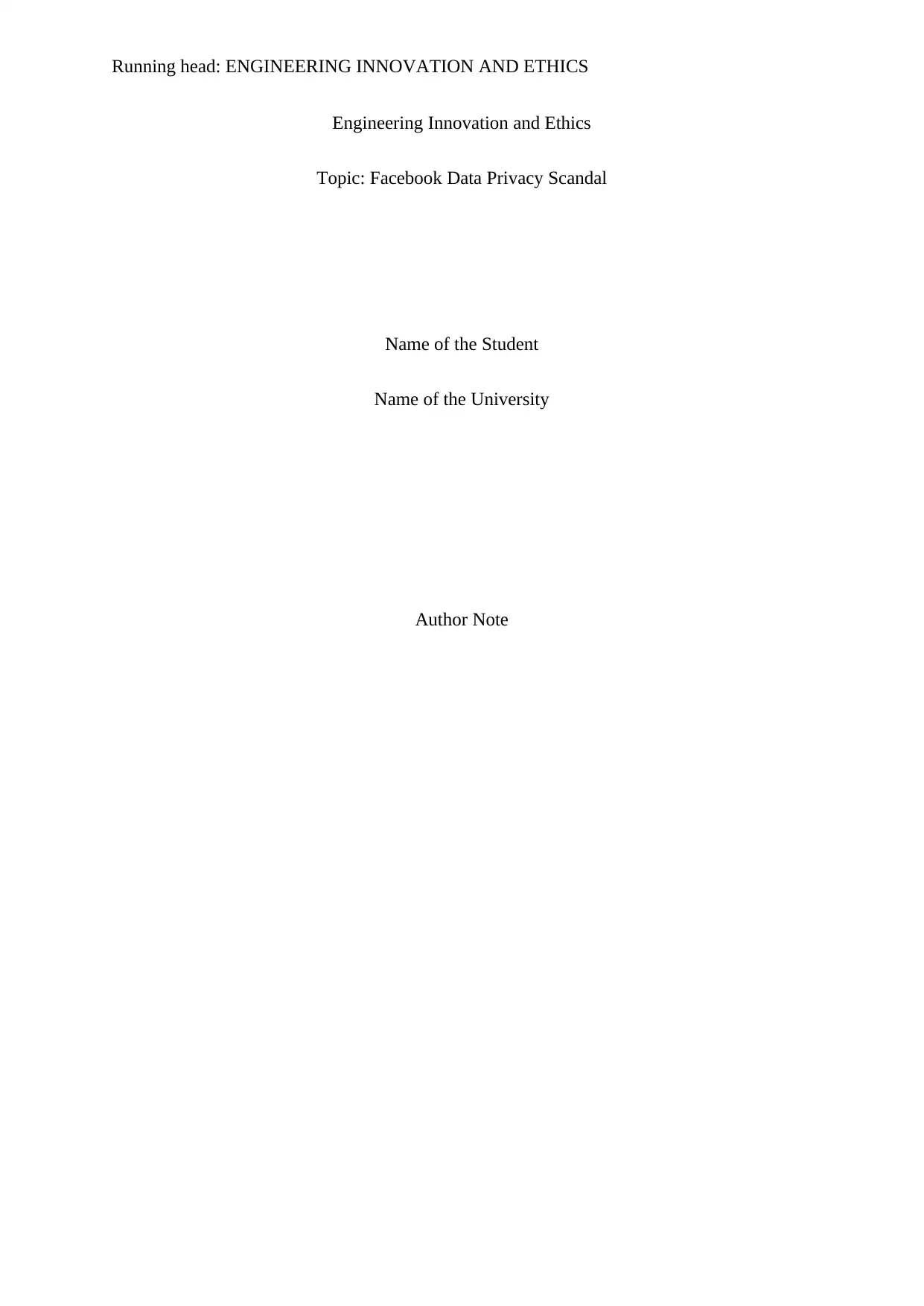
Running head: ENGINEERING INNOVATION AND ETHICS
Engineering Innovation and Ethics
Topic: Facebook Data Privacy Scandal
Name of the Student
Name of the University
Author Note
Engineering Innovation and Ethics
Topic: Facebook Data Privacy Scandal
Name of the Student
Name of the University
Author Note
Paraphrase This Document
Need a fresh take? Get an instant paraphrase of this document with our AI Paraphraser
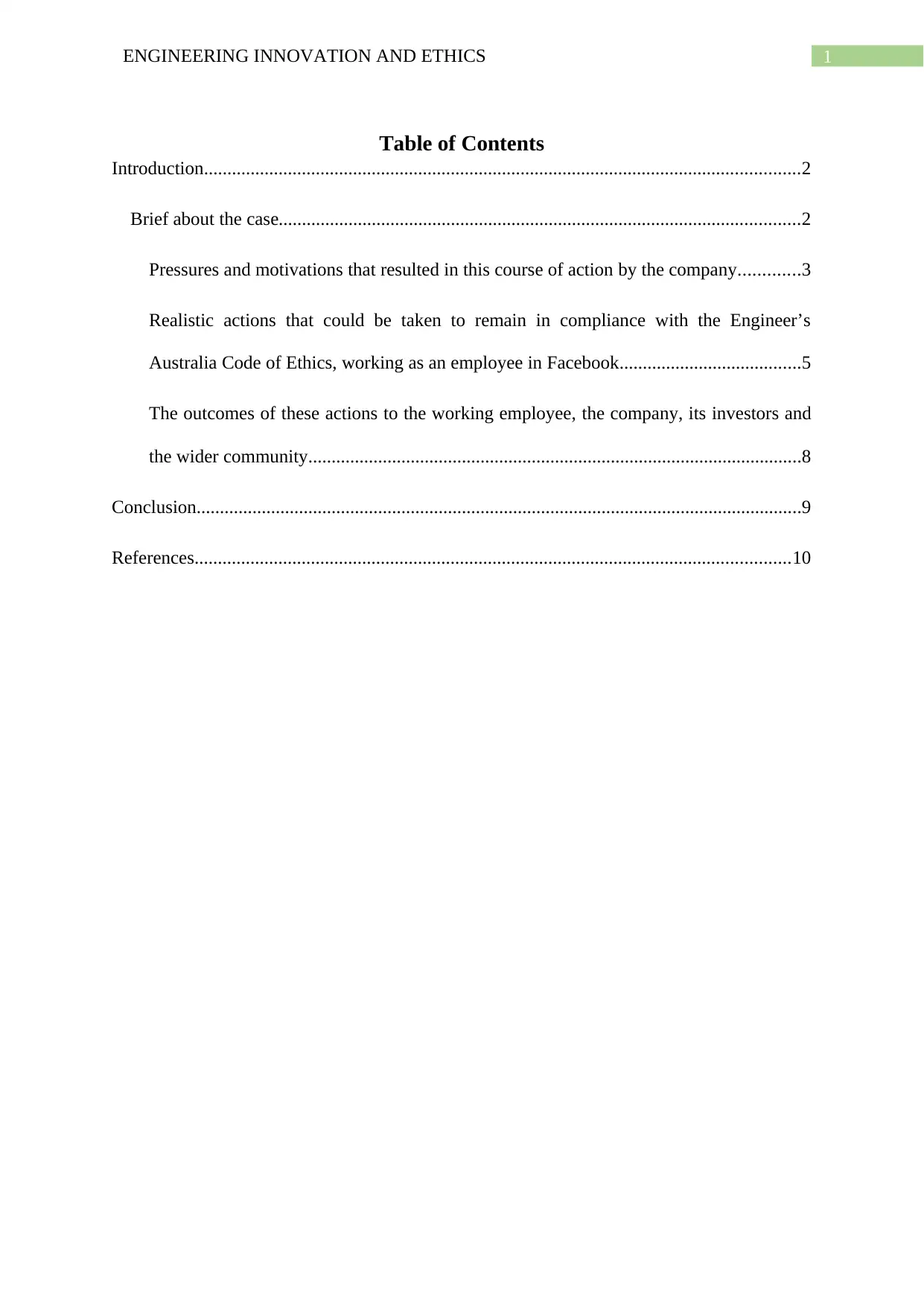
1ENGINEERING INNOVATION AND ETHICS
Table of Contents
Introduction................................................................................................................................2
Brief about the case................................................................................................................2
Pressures and motivations that resulted in this course of action by the company.............3
Realistic actions that could be taken to remain in compliance with the Engineer’s
Australia Code of Ethics, working as an employee in Facebook.......................................5
The outcomes of these actions to the working employee, the company, its investors and
the wider community..........................................................................................................8
Conclusion..................................................................................................................................9
References................................................................................................................................10
Table of Contents
Introduction................................................................................................................................2
Brief about the case................................................................................................................2
Pressures and motivations that resulted in this course of action by the company.............3
Realistic actions that could be taken to remain in compliance with the Engineer’s
Australia Code of Ethics, working as an employee in Facebook.......................................5
The outcomes of these actions to the working employee, the company, its investors and
the wider community..........................................................................................................8
Conclusion..................................................................................................................................9
References................................................................................................................................10
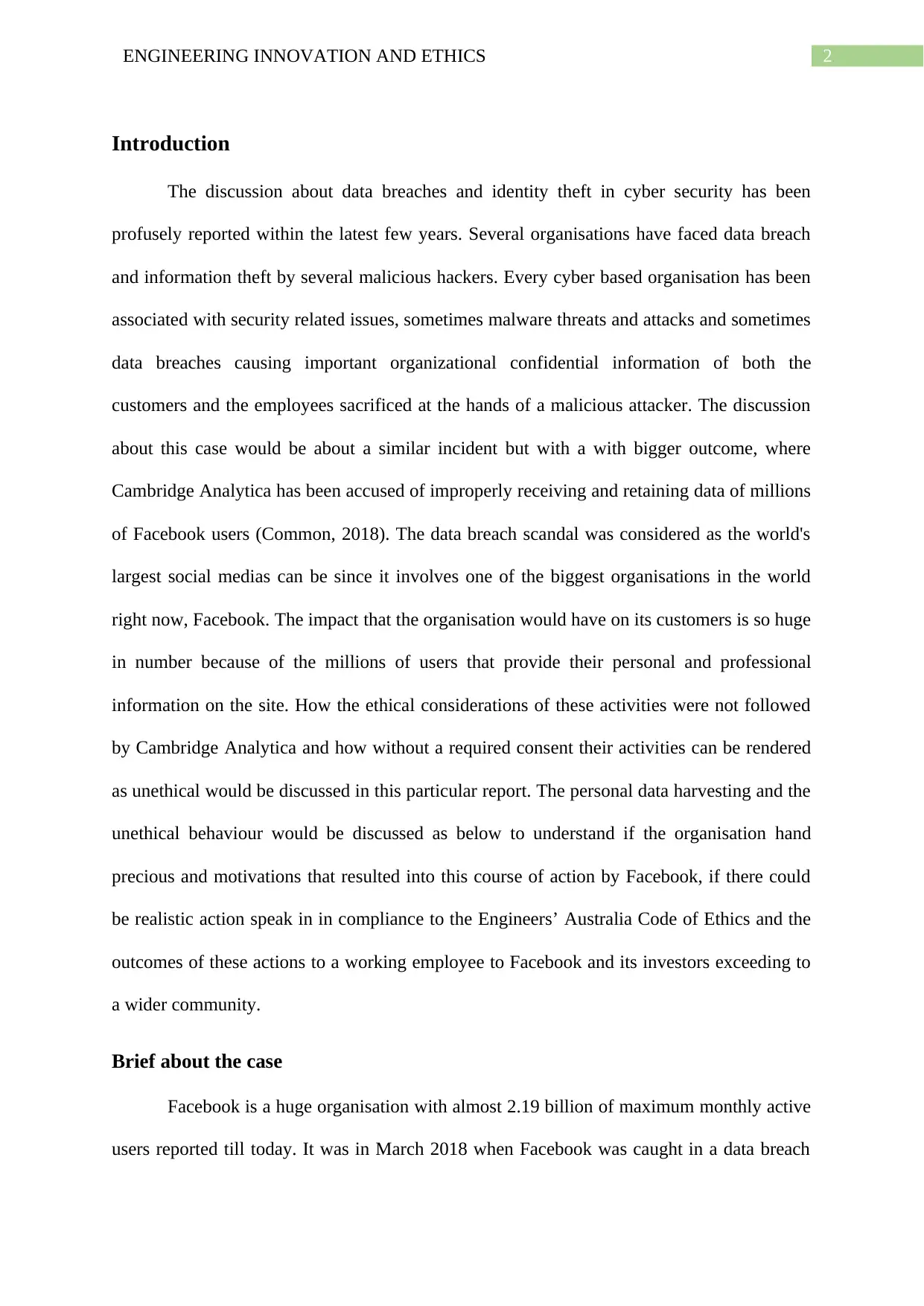
2ENGINEERING INNOVATION AND ETHICS
Introduction
The discussion about data breaches and identity theft in cyber security has been
profusely reported within the latest few years. Several organisations have faced data breach
and information theft by several malicious hackers. Every cyber based organisation has been
associated with security related issues, sometimes malware threats and attacks and sometimes
data breaches causing important organizational confidential information of both the
customers and the employees sacrificed at the hands of a malicious attacker. The discussion
about this case would be about a similar incident but with a with bigger outcome, where
Cambridge Analytica has been accused of improperly receiving and retaining data of millions
of Facebook users (Common, 2018). The data breach scandal was considered as the world's
largest social medias can be since it involves one of the biggest organisations in the world
right now, Facebook. The impact that the organisation would have on its customers is so huge
in number because of the millions of users that provide their personal and professional
information on the site. How the ethical considerations of these activities were not followed
by Cambridge Analytica and how without a required consent their activities can be rendered
as unethical would be discussed in this particular report. The personal data harvesting and the
unethical behaviour would be discussed as below to understand if the organisation hand
precious and motivations that resulted into this course of action by Facebook, if there could
be realistic action speak in in compliance to the Engineers’ Australia Code of Ethics and the
outcomes of these actions to a working employee to Facebook and its investors exceeding to
a wider community.
Brief about the case
Facebook is a huge organisation with almost 2.19 billion of maximum monthly active
users reported till today. It was in March 2018 when Facebook was caught in a data breach
Introduction
The discussion about data breaches and identity theft in cyber security has been
profusely reported within the latest few years. Several organisations have faced data breach
and information theft by several malicious hackers. Every cyber based organisation has been
associated with security related issues, sometimes malware threats and attacks and sometimes
data breaches causing important organizational confidential information of both the
customers and the employees sacrificed at the hands of a malicious attacker. The discussion
about this case would be about a similar incident but with a with bigger outcome, where
Cambridge Analytica has been accused of improperly receiving and retaining data of millions
of Facebook users (Common, 2018). The data breach scandal was considered as the world's
largest social medias can be since it involves one of the biggest organisations in the world
right now, Facebook. The impact that the organisation would have on its customers is so huge
in number because of the millions of users that provide their personal and professional
information on the site. How the ethical considerations of these activities were not followed
by Cambridge Analytica and how without a required consent their activities can be rendered
as unethical would be discussed in this particular report. The personal data harvesting and the
unethical behaviour would be discussed as below to understand if the organisation hand
precious and motivations that resulted into this course of action by Facebook, if there could
be realistic action speak in in compliance to the Engineers’ Australia Code of Ethics and the
outcomes of these actions to a working employee to Facebook and its investors exceeding to
a wider community.
Brief about the case
Facebook is a huge organisation with almost 2.19 billion of maximum monthly active
users reported till today. It was in March 2018 when Facebook was caught in a data breach
⊘ This is a preview!⊘
Do you want full access?
Subscribe today to unlock all pages.

Trusted by 1+ million students worldwide
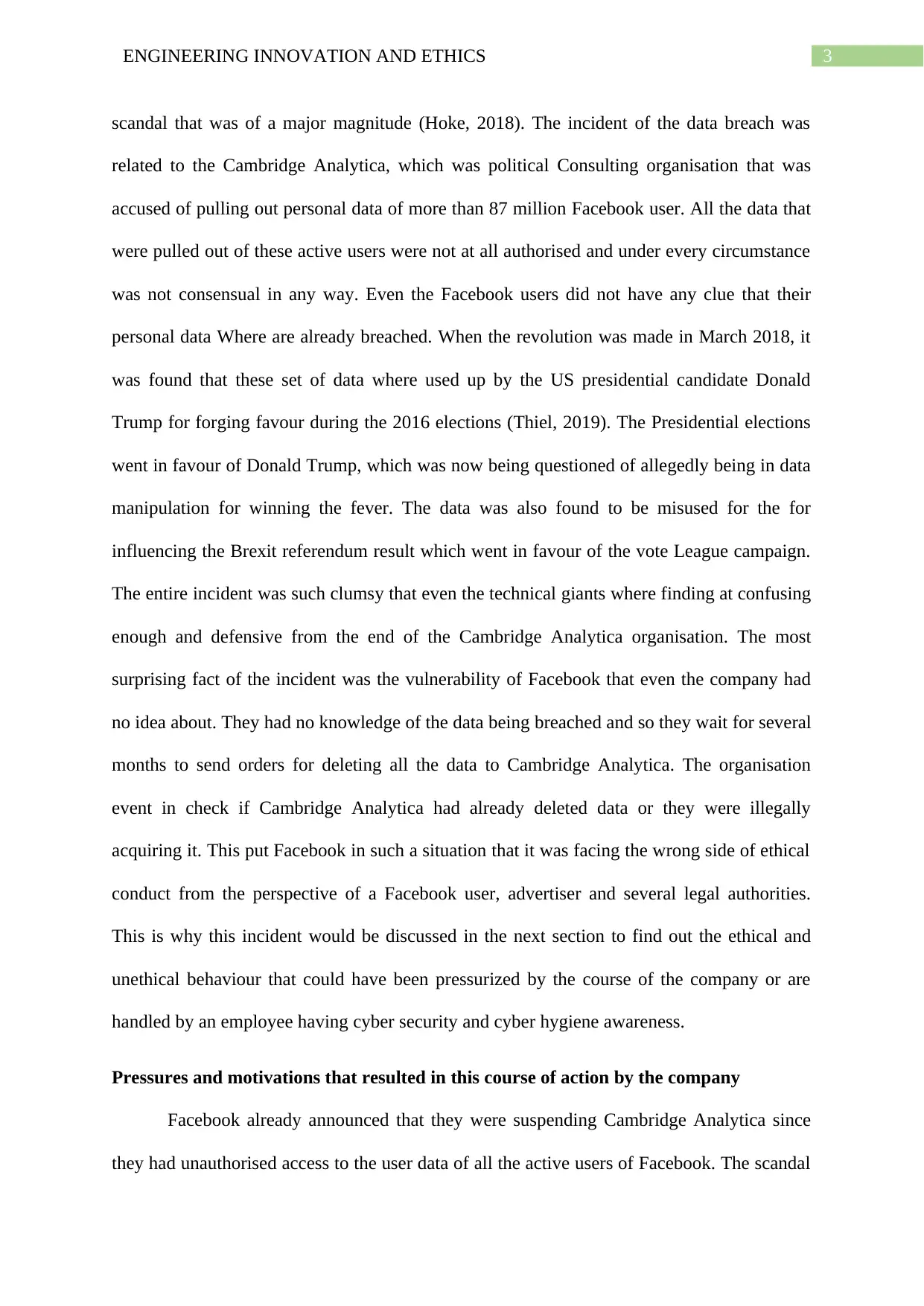
3ENGINEERING INNOVATION AND ETHICS
scandal that was of a major magnitude (Hoke, 2018). The incident of the data breach was
related to the Cambridge Analytica, which was political Consulting organisation that was
accused of pulling out personal data of more than 87 million Facebook user. All the data that
were pulled out of these active users were not at all authorised and under every circumstance
was not consensual in any way. Even the Facebook users did not have any clue that their
personal data Where are already breached. When the revolution was made in March 2018, it
was found that these set of data where used up by the US presidential candidate Donald
Trump for forging favour during the 2016 elections (Thiel, 2019). The Presidential elections
went in favour of Donald Trump, which was now being questioned of allegedly being in data
manipulation for winning the fever. The data was also found to be misused for the for
influencing the Brexit referendum result which went in favour of the vote League campaign.
The entire incident was such clumsy that even the technical giants where finding at confusing
enough and defensive from the end of the Cambridge Analytica organisation. The most
surprising fact of the incident was the vulnerability of Facebook that even the company had
no idea about. They had no knowledge of the data being breached and so they wait for several
months to send orders for deleting all the data to Cambridge Analytica. The organisation
event in check if Cambridge Analytica had already deleted data or they were illegally
acquiring it. This put Facebook in such a situation that it was facing the wrong side of ethical
conduct from the perspective of a Facebook user, advertiser and several legal authorities.
This is why this incident would be discussed in the next section to find out the ethical and
unethical behaviour that could have been pressurized by the course of the company or are
handled by an employee having cyber security and cyber hygiene awareness.
Pressures and motivations that resulted in this course of action by the company
Facebook already announced that they were suspending Cambridge Analytica since
they had unauthorised access to the user data of all the active users of Facebook. The scandal
scandal that was of a major magnitude (Hoke, 2018). The incident of the data breach was
related to the Cambridge Analytica, which was political Consulting organisation that was
accused of pulling out personal data of more than 87 million Facebook user. All the data that
were pulled out of these active users were not at all authorised and under every circumstance
was not consensual in any way. Even the Facebook users did not have any clue that their
personal data Where are already breached. When the revolution was made in March 2018, it
was found that these set of data where used up by the US presidential candidate Donald
Trump for forging favour during the 2016 elections (Thiel, 2019). The Presidential elections
went in favour of Donald Trump, which was now being questioned of allegedly being in data
manipulation for winning the fever. The data was also found to be misused for the for
influencing the Brexit referendum result which went in favour of the vote League campaign.
The entire incident was such clumsy that even the technical giants where finding at confusing
enough and defensive from the end of the Cambridge Analytica organisation. The most
surprising fact of the incident was the vulnerability of Facebook that even the company had
no idea about. They had no knowledge of the data being breached and so they wait for several
months to send orders for deleting all the data to Cambridge Analytica. The organisation
event in check if Cambridge Analytica had already deleted data or they were illegally
acquiring it. This put Facebook in such a situation that it was facing the wrong side of ethical
conduct from the perspective of a Facebook user, advertiser and several legal authorities.
This is why this incident would be discussed in the next section to find out the ethical and
unethical behaviour that could have been pressurized by the course of the company or are
handled by an employee having cyber security and cyber hygiene awareness.
Pressures and motivations that resulted in this course of action by the company
Facebook already announced that they were suspending Cambridge Analytica since
they had unauthorised access to the user data of all the active users of Facebook. The scandal
Paraphrase This Document
Need a fresh take? Get an instant paraphrase of this document with our AI Paraphraser
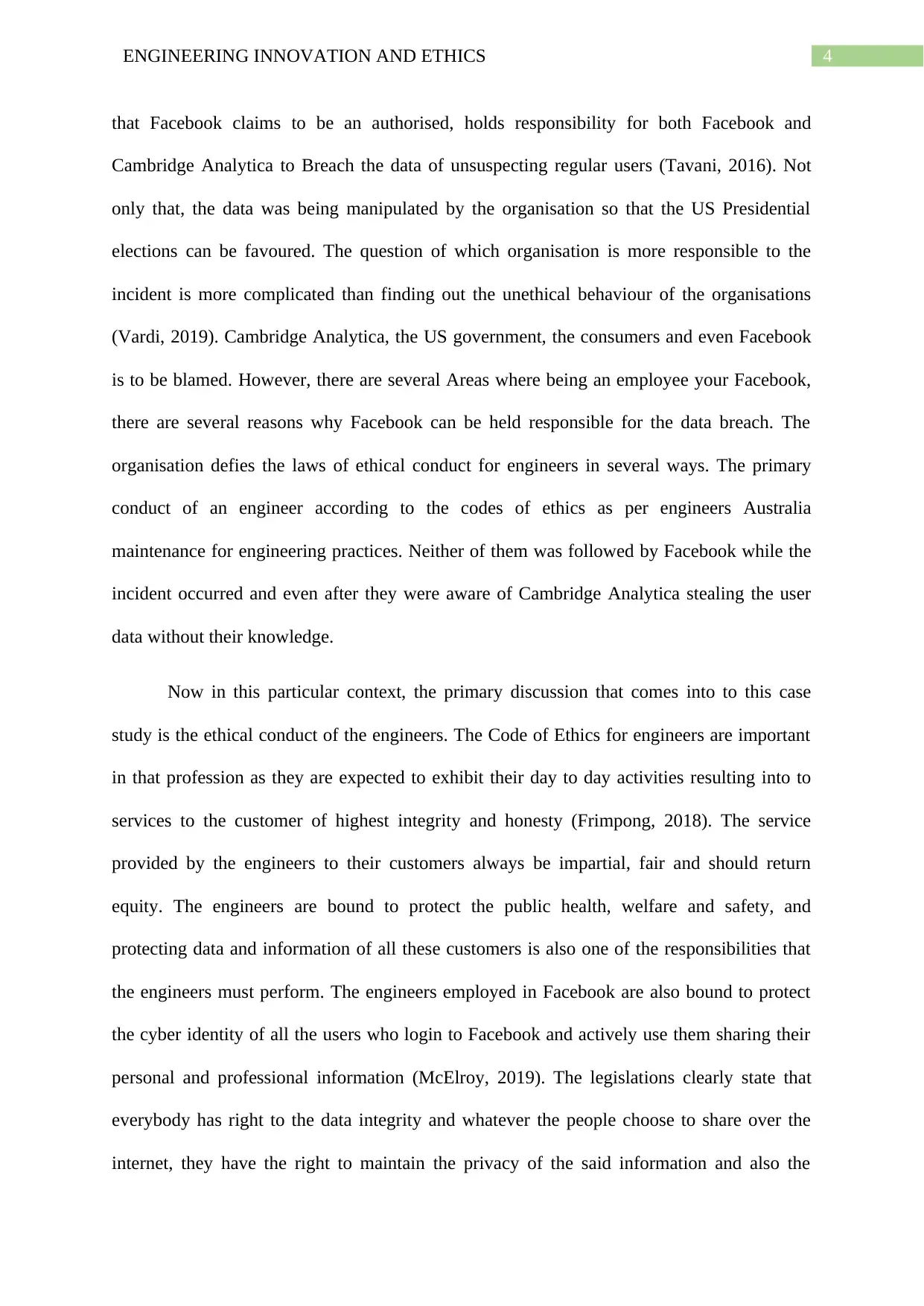
4ENGINEERING INNOVATION AND ETHICS
that Facebook claims to be an authorised, holds responsibility for both Facebook and
Cambridge Analytica to Breach the data of unsuspecting regular users (Tavani, 2016). Not
only that, the data was being manipulated by the organisation so that the US Presidential
elections can be favoured. The question of which organisation is more responsible to the
incident is more complicated than finding out the unethical behaviour of the organisations
(Vardi, 2019). Cambridge Analytica, the US government, the consumers and even Facebook
is to be blamed. However, there are several Areas where being an employee your Facebook,
there are several reasons why Facebook can be held responsible for the data breach. The
organisation defies the laws of ethical conduct for engineers in several ways. The primary
conduct of an engineer according to the codes of ethics as per engineers Australia
maintenance for engineering practices. Neither of them was followed by Facebook while the
incident occurred and even after they were aware of Cambridge Analytica stealing the user
data without their knowledge.
Now in this particular context, the primary discussion that comes into to this case
study is the ethical conduct of the engineers. The Code of Ethics for engineers are important
in that profession as they are expected to exhibit their day to day activities resulting into to
services to the customer of highest integrity and honesty (Frimpong, 2018). The service
provided by the engineers to their customers always be impartial, fair and should return
equity. The engineers are bound to protect the public health, welfare and safety, and
protecting data and information of all these customers is also one of the responsibilities that
the engineers must perform. The engineers employed in Facebook are also bound to protect
the cyber identity of all the users who login to Facebook and actively use them sharing their
personal and professional information (McElroy, 2019). The legislations clearly state that
everybody has right to the data integrity and whatever the people choose to share over the
internet, they have the right to maintain the privacy of the said information and also the
that Facebook claims to be an authorised, holds responsibility for both Facebook and
Cambridge Analytica to Breach the data of unsuspecting regular users (Tavani, 2016). Not
only that, the data was being manipulated by the organisation so that the US Presidential
elections can be favoured. The question of which organisation is more responsible to the
incident is more complicated than finding out the unethical behaviour of the organisations
(Vardi, 2019). Cambridge Analytica, the US government, the consumers and even Facebook
is to be blamed. However, there are several Areas where being an employee your Facebook,
there are several reasons why Facebook can be held responsible for the data breach. The
organisation defies the laws of ethical conduct for engineers in several ways. The primary
conduct of an engineer according to the codes of ethics as per engineers Australia
maintenance for engineering practices. Neither of them was followed by Facebook while the
incident occurred and even after they were aware of Cambridge Analytica stealing the user
data without their knowledge.
Now in this particular context, the primary discussion that comes into to this case
study is the ethical conduct of the engineers. The Code of Ethics for engineers are important
in that profession as they are expected to exhibit their day to day activities resulting into to
services to the customer of highest integrity and honesty (Frimpong, 2018). The service
provided by the engineers to their customers always be impartial, fair and should return
equity. The engineers are bound to protect the public health, welfare and safety, and
protecting data and information of all these customers is also one of the responsibilities that
the engineers must perform. The engineers employed in Facebook are also bound to protect
the cyber identity of all the users who login to Facebook and actively use them sharing their
personal and professional information (McElroy, 2019). The legislations clearly state that
everybody has right to the data integrity and whatever the people choose to share over the
internet, they have the right to maintain the privacy of the said information and also the
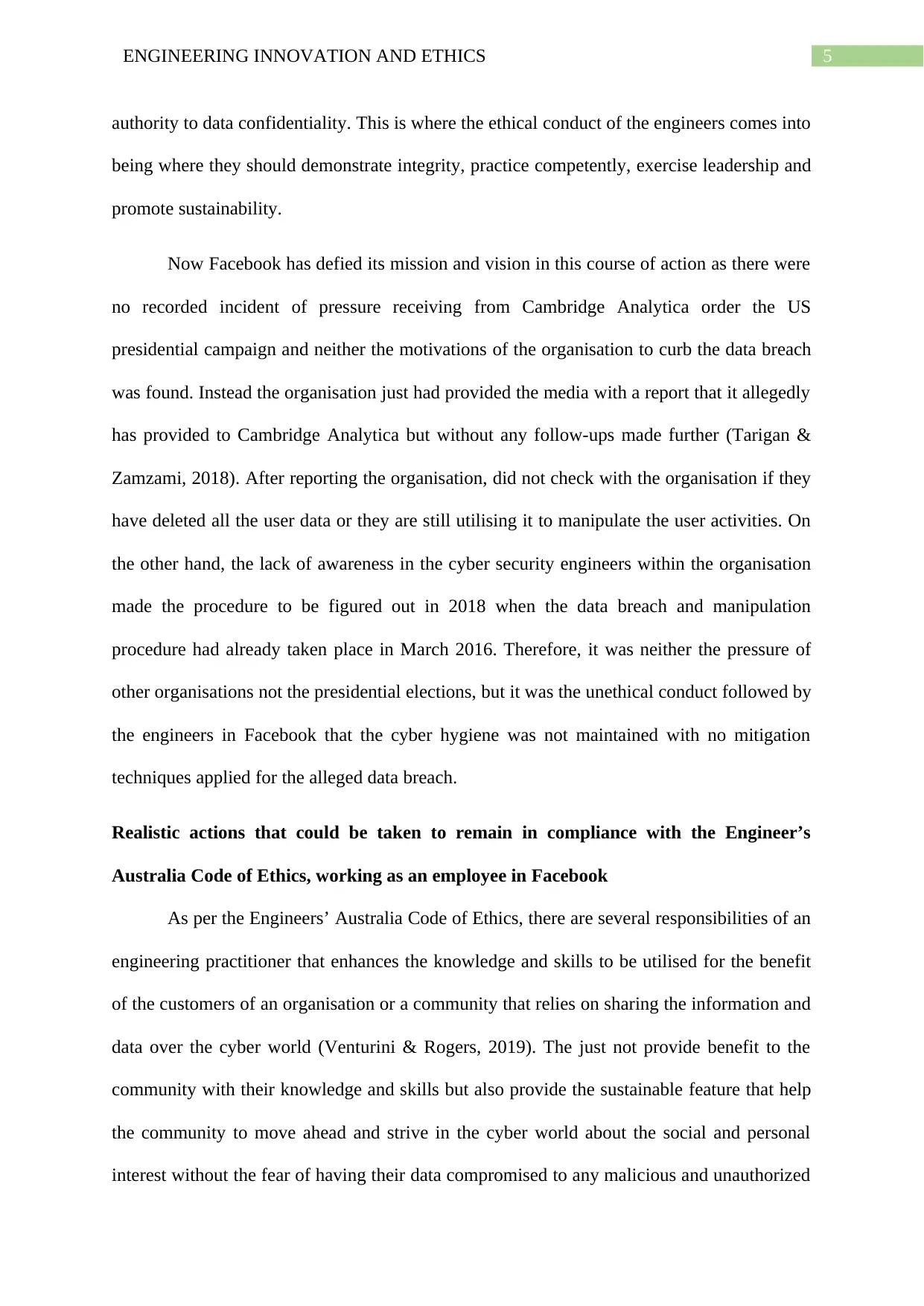
5ENGINEERING INNOVATION AND ETHICS
authority to data confidentiality. This is where the ethical conduct of the engineers comes into
being where they should demonstrate integrity, practice competently, exercise leadership and
promote sustainability.
Now Facebook has defied its mission and vision in this course of action as there were
no recorded incident of pressure receiving from Cambridge Analytica order the US
presidential campaign and neither the motivations of the organisation to curb the data breach
was found. Instead the organisation just had provided the media with a report that it allegedly
has provided to Cambridge Analytica but without any follow-ups made further (Tarigan &
Zamzami, 2018). After reporting the organisation, did not check with the organisation if they
have deleted all the user data or they are still utilising it to manipulate the user activities. On
the other hand, the lack of awareness in the cyber security engineers within the organisation
made the procedure to be figured out in 2018 when the data breach and manipulation
procedure had already taken place in March 2016. Therefore, it was neither the pressure of
other organisations not the presidential elections, but it was the unethical conduct followed by
the engineers in Facebook that the cyber hygiene was not maintained with no mitigation
techniques applied for the alleged data breach.
Realistic actions that could be taken to remain in compliance with the Engineer’s
Australia Code of Ethics, working as an employee in Facebook
As per the Engineers’ Australia Code of Ethics, there are several responsibilities of an
engineering practitioner that enhances the knowledge and skills to be utilised for the benefit
of the customers of an organisation or a community that relies on sharing the information and
data over the cyber world (Venturini & Rogers, 2019). The just not provide benefit to the
community with their knowledge and skills but also provide the sustainable feature that help
the community to move ahead and strive in the cyber world about the social and personal
interest without the fear of having their data compromised to any malicious and unauthorized
authority to data confidentiality. This is where the ethical conduct of the engineers comes into
being where they should demonstrate integrity, practice competently, exercise leadership and
promote sustainability.
Now Facebook has defied its mission and vision in this course of action as there were
no recorded incident of pressure receiving from Cambridge Analytica order the US
presidential campaign and neither the motivations of the organisation to curb the data breach
was found. Instead the organisation just had provided the media with a report that it allegedly
has provided to Cambridge Analytica but without any follow-ups made further (Tarigan &
Zamzami, 2018). After reporting the organisation, did not check with the organisation if they
have deleted all the user data or they are still utilising it to manipulate the user activities. On
the other hand, the lack of awareness in the cyber security engineers within the organisation
made the procedure to be figured out in 2018 when the data breach and manipulation
procedure had already taken place in March 2016. Therefore, it was neither the pressure of
other organisations not the presidential elections, but it was the unethical conduct followed by
the engineers in Facebook that the cyber hygiene was not maintained with no mitigation
techniques applied for the alleged data breach.
Realistic actions that could be taken to remain in compliance with the Engineer’s
Australia Code of Ethics, working as an employee in Facebook
As per the Engineers’ Australia Code of Ethics, there are several responsibilities of an
engineering practitioner that enhances the knowledge and skills to be utilised for the benefit
of the customers of an organisation or a community that relies on sharing the information and
data over the cyber world (Venturini & Rogers, 2019). The just not provide benefit to the
community with their knowledge and skills but also provide the sustainable feature that help
the community to move ahead and strive in the cyber world about the social and personal
interest without the fear of having their data compromised to any malicious and unauthorized
⊘ This is a preview!⊘
Do you want full access?
Subscribe today to unlock all pages.

Trusted by 1+ million students worldwide
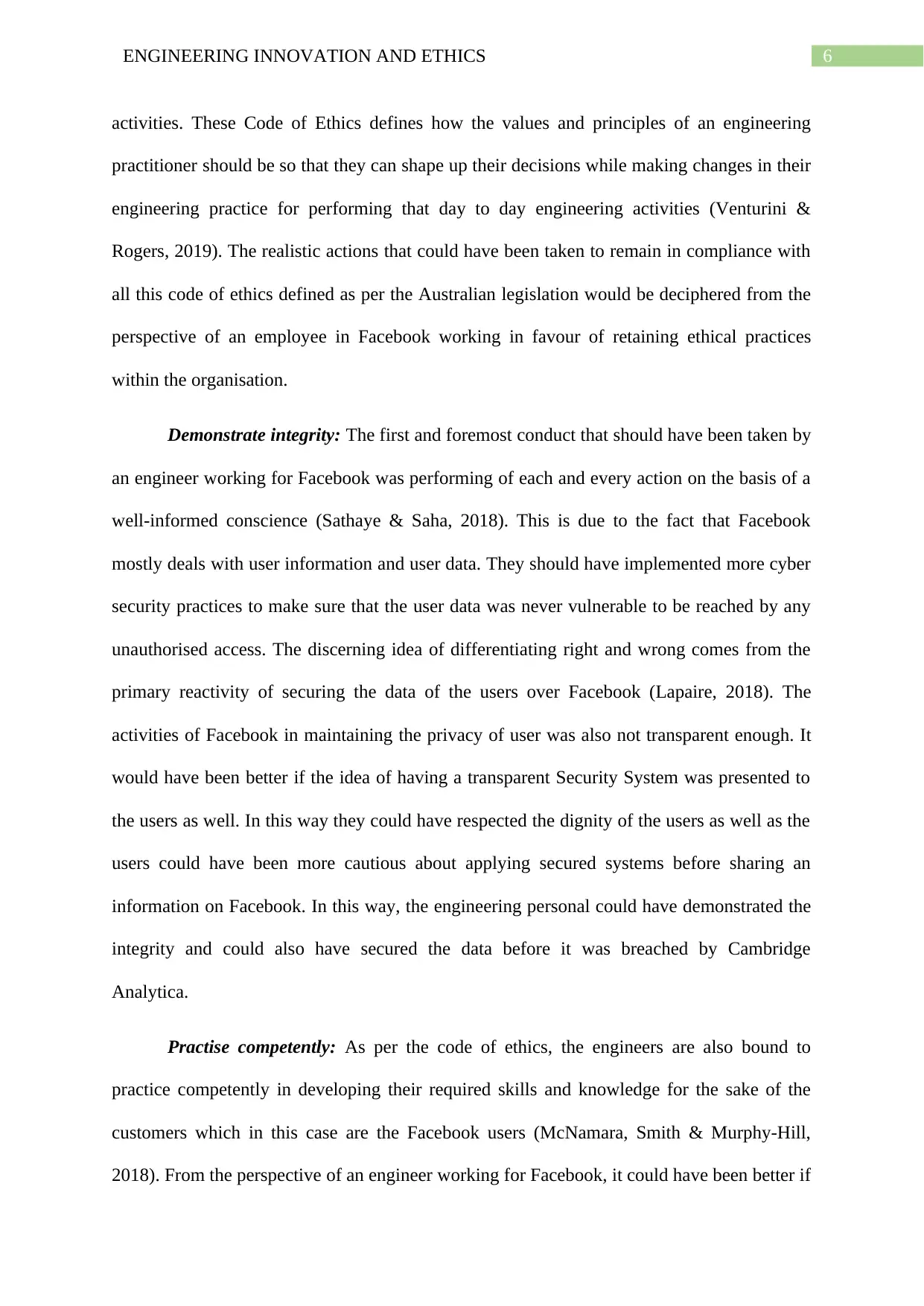
6ENGINEERING INNOVATION AND ETHICS
activities. These Code of Ethics defines how the values and principles of an engineering
practitioner should be so that they can shape up their decisions while making changes in their
engineering practice for performing that day to day engineering activities (Venturini &
Rogers, 2019). The realistic actions that could have been taken to remain in compliance with
all this code of ethics defined as per the Australian legislation would be deciphered from the
perspective of an employee in Facebook working in favour of retaining ethical practices
within the organisation.
Demonstrate integrity: The first and foremost conduct that should have been taken by
an engineer working for Facebook was performing of each and every action on the basis of a
well-informed conscience (Sathaye & Saha, 2018). This is due to the fact that Facebook
mostly deals with user information and user data. They should have implemented more cyber
security practices to make sure that the user data was never vulnerable to be reached by any
unauthorised access. The discerning idea of differentiating right and wrong comes from the
primary reactivity of securing the data of the users over Facebook (Lapaire, 2018). The
activities of Facebook in maintaining the privacy of user was also not transparent enough. It
would have been better if the idea of having a transparent Security System was presented to
the users as well. In this way they could have respected the dignity of the users as well as the
users could have been more cautious about applying secured systems before sharing an
information on Facebook. In this way, the engineering personal could have demonstrated the
integrity and could also have secured the data before it was breached by Cambridge
Analytica.
Practise competently: As per the code of ethics, the engineers are also bound to
practice competently in developing their required skills and knowledge for the sake of the
customers which in this case are the Facebook users (McNamara, Smith & Murphy-Hill,
2018). From the perspective of an engineer working for Facebook, it could have been better if
activities. These Code of Ethics defines how the values and principles of an engineering
practitioner should be so that they can shape up their decisions while making changes in their
engineering practice for performing that day to day engineering activities (Venturini &
Rogers, 2019). The realistic actions that could have been taken to remain in compliance with
all this code of ethics defined as per the Australian legislation would be deciphered from the
perspective of an employee in Facebook working in favour of retaining ethical practices
within the organisation.
Demonstrate integrity: The first and foremost conduct that should have been taken by
an engineer working for Facebook was performing of each and every action on the basis of a
well-informed conscience (Sathaye & Saha, 2018). This is due to the fact that Facebook
mostly deals with user information and user data. They should have implemented more cyber
security practices to make sure that the user data was never vulnerable to be reached by any
unauthorised access. The discerning idea of differentiating right and wrong comes from the
primary reactivity of securing the data of the users over Facebook (Lapaire, 2018). The
activities of Facebook in maintaining the privacy of user was also not transparent enough. It
would have been better if the idea of having a transparent Security System was presented to
the users as well. In this way they could have respected the dignity of the users as well as the
users could have been more cautious about applying secured systems before sharing an
information on Facebook. In this way, the engineering personal could have demonstrated the
integrity and could also have secured the data before it was breached by Cambridge
Analytica.
Practise competently: As per the code of ethics, the engineers are also bound to
practice competently in developing their required skills and knowledge for the sake of the
customers which in this case are the Facebook users (McNamara, Smith & Murphy-Hill,
2018). From the perspective of an engineer working for Facebook, it could have been better if
Paraphrase This Document
Need a fresh take? Get an instant paraphrase of this document with our AI Paraphraser
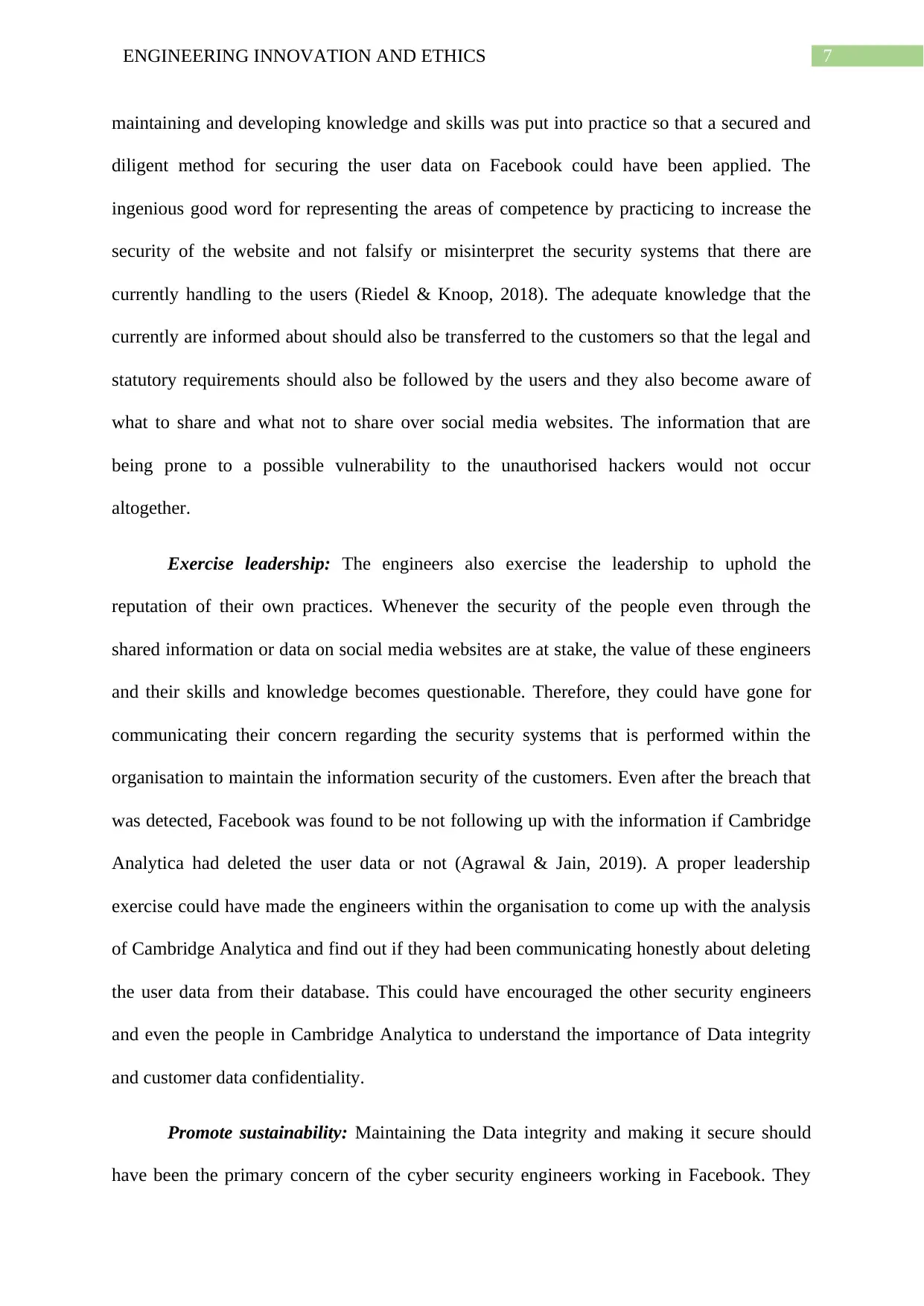
7ENGINEERING INNOVATION AND ETHICS
maintaining and developing knowledge and skills was put into practice so that a secured and
diligent method for securing the user data on Facebook could have been applied. The
ingenious good word for representing the areas of competence by practicing to increase the
security of the website and not falsify or misinterpret the security systems that there are
currently handling to the users (Riedel & Knoop, 2018). The adequate knowledge that the
currently are informed about should also be transferred to the customers so that the legal and
statutory requirements should also be followed by the users and they also become aware of
what to share and what not to share over social media websites. The information that are
being prone to a possible vulnerability to the unauthorised hackers would not occur
altogether.
Exercise leadership: The engineers also exercise the leadership to uphold the
reputation of their own practices. Whenever the security of the people even through the
shared information or data on social media websites are at stake, the value of these engineers
and their skills and knowledge becomes questionable. Therefore, they could have gone for
communicating their concern regarding the security systems that is performed within the
organisation to maintain the information security of the customers. Even after the breach that
was detected, Facebook was found to be not following up with the information if Cambridge
Analytica had deleted the user data or not (Agrawal & Jain, 2019). A proper leadership
exercise could have made the engineers within the organisation to come up with the analysis
of Cambridge Analytica and find out if they had been communicating honestly about deleting
the user data from their database. This could have encouraged the other security engineers
and even the people in Cambridge Analytica to understand the importance of Data integrity
and customer data confidentiality.
Promote sustainability: Maintaining the Data integrity and making it secure should
have been the primary concern of the cyber security engineers working in Facebook. They
maintaining and developing knowledge and skills was put into practice so that a secured and
diligent method for securing the user data on Facebook could have been applied. The
ingenious good word for representing the areas of competence by practicing to increase the
security of the website and not falsify or misinterpret the security systems that there are
currently handling to the users (Riedel & Knoop, 2018). The adequate knowledge that the
currently are informed about should also be transferred to the customers so that the legal and
statutory requirements should also be followed by the users and they also become aware of
what to share and what not to share over social media websites. The information that are
being prone to a possible vulnerability to the unauthorised hackers would not occur
altogether.
Exercise leadership: The engineers also exercise the leadership to uphold the
reputation of their own practices. Whenever the security of the people even through the
shared information or data on social media websites are at stake, the value of these engineers
and their skills and knowledge becomes questionable. Therefore, they could have gone for
communicating their concern regarding the security systems that is performed within the
organisation to maintain the information security of the customers. Even after the breach that
was detected, Facebook was found to be not following up with the information if Cambridge
Analytica had deleted the user data or not (Agrawal & Jain, 2019). A proper leadership
exercise could have made the engineers within the organisation to come up with the analysis
of Cambridge Analytica and find out if they had been communicating honestly about deleting
the user data from their database. This could have encouraged the other security engineers
and even the people in Cambridge Analytica to understand the importance of Data integrity
and customer data confidentiality.
Promote sustainability: Maintaining the Data integrity and making it secure should
have been the primary concern of the cyber security engineers working in Facebook. They
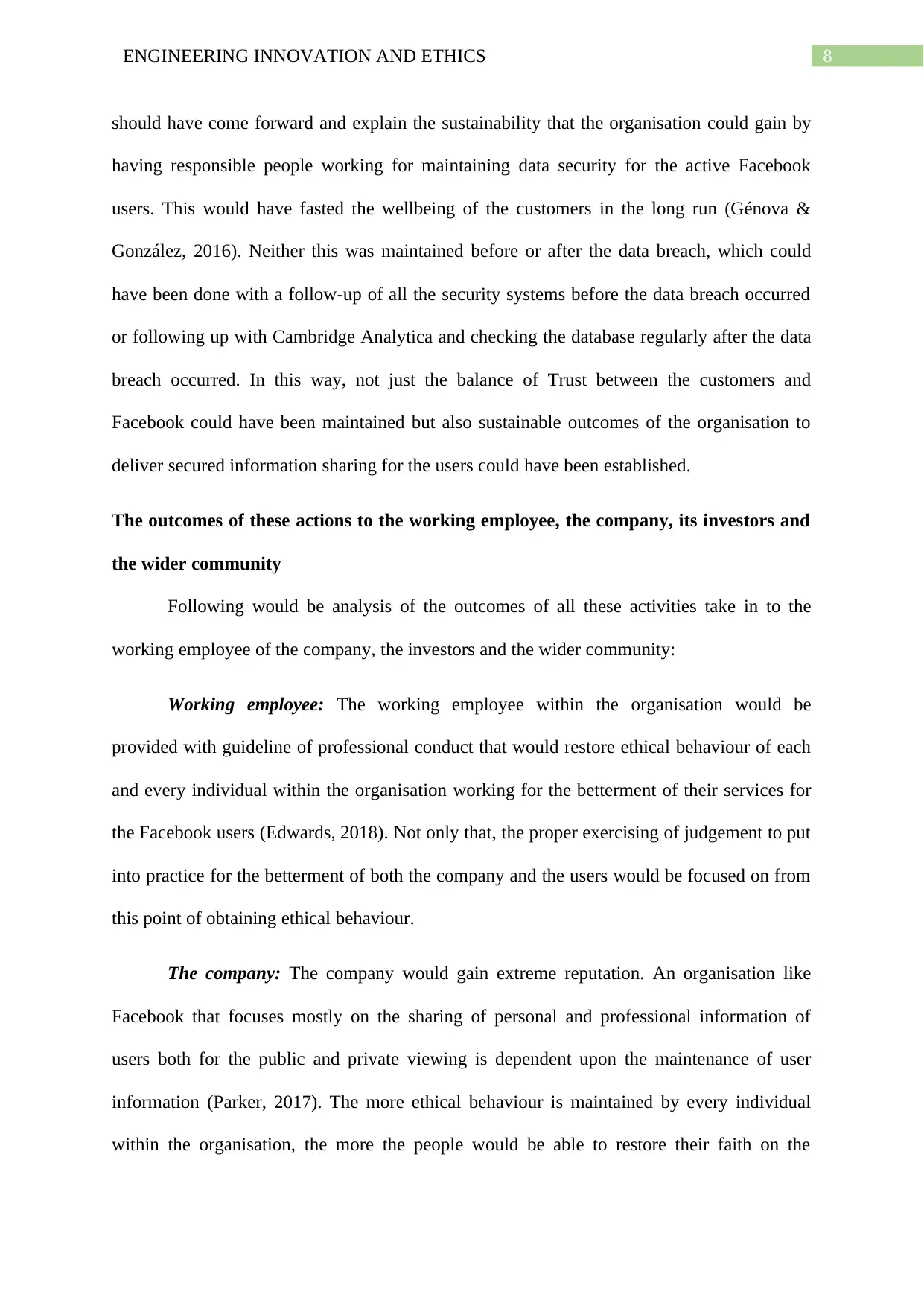
8ENGINEERING INNOVATION AND ETHICS
should have come forward and explain the sustainability that the organisation could gain by
having responsible people working for maintaining data security for the active Facebook
users. This would have fasted the wellbeing of the customers in the long run (Génova &
González, 2016). Neither this was maintained before or after the data breach, which could
have been done with a follow-up of all the security systems before the data breach occurred
or following up with Cambridge Analytica and checking the database regularly after the data
breach occurred. In this way, not just the balance of Trust between the customers and
Facebook could have been maintained but also sustainable outcomes of the organisation to
deliver secured information sharing for the users could have been established.
The outcomes of these actions to the working employee, the company, its investors and
the wider community
Following would be analysis of the outcomes of all these activities take in to the
working employee of the company, the investors and the wider community:
Working employee: The working employee within the organisation would be
provided with guideline of professional conduct that would restore ethical behaviour of each
and every individual within the organisation working for the betterment of their services for
the Facebook users (Edwards, 2018). Not only that, the proper exercising of judgement to put
into practice for the betterment of both the company and the users would be focused on from
this point of obtaining ethical behaviour.
The company: The company would gain extreme reputation. An organisation like
Facebook that focuses mostly on the sharing of personal and professional information of
users both for the public and private viewing is dependent upon the maintenance of user
information (Parker, 2017). The more ethical behaviour is maintained by every individual
within the organisation, the more the people would be able to restore their faith on the
should have come forward and explain the sustainability that the organisation could gain by
having responsible people working for maintaining data security for the active Facebook
users. This would have fasted the wellbeing of the customers in the long run (Génova &
González, 2016). Neither this was maintained before or after the data breach, which could
have been done with a follow-up of all the security systems before the data breach occurred
or following up with Cambridge Analytica and checking the database regularly after the data
breach occurred. In this way, not just the balance of Trust between the customers and
Facebook could have been maintained but also sustainable outcomes of the organisation to
deliver secured information sharing for the users could have been established.
The outcomes of these actions to the working employee, the company, its investors and
the wider community
Following would be analysis of the outcomes of all these activities take in to the
working employee of the company, the investors and the wider community:
Working employee: The working employee within the organisation would be
provided with guideline of professional conduct that would restore ethical behaviour of each
and every individual within the organisation working for the betterment of their services for
the Facebook users (Edwards, 2018). Not only that, the proper exercising of judgement to put
into practice for the betterment of both the company and the users would be focused on from
this point of obtaining ethical behaviour.
The company: The company would gain extreme reputation. An organisation like
Facebook that focuses mostly on the sharing of personal and professional information of
users both for the public and private viewing is dependent upon the maintenance of user
information (Parker, 2017). The more ethical behaviour is maintained by every individual
within the organisation, the more the people would be able to restore their faith on the
⊘ This is a preview!⊘
Do you want full access?
Subscribe today to unlock all pages.

Trusted by 1+ million students worldwide
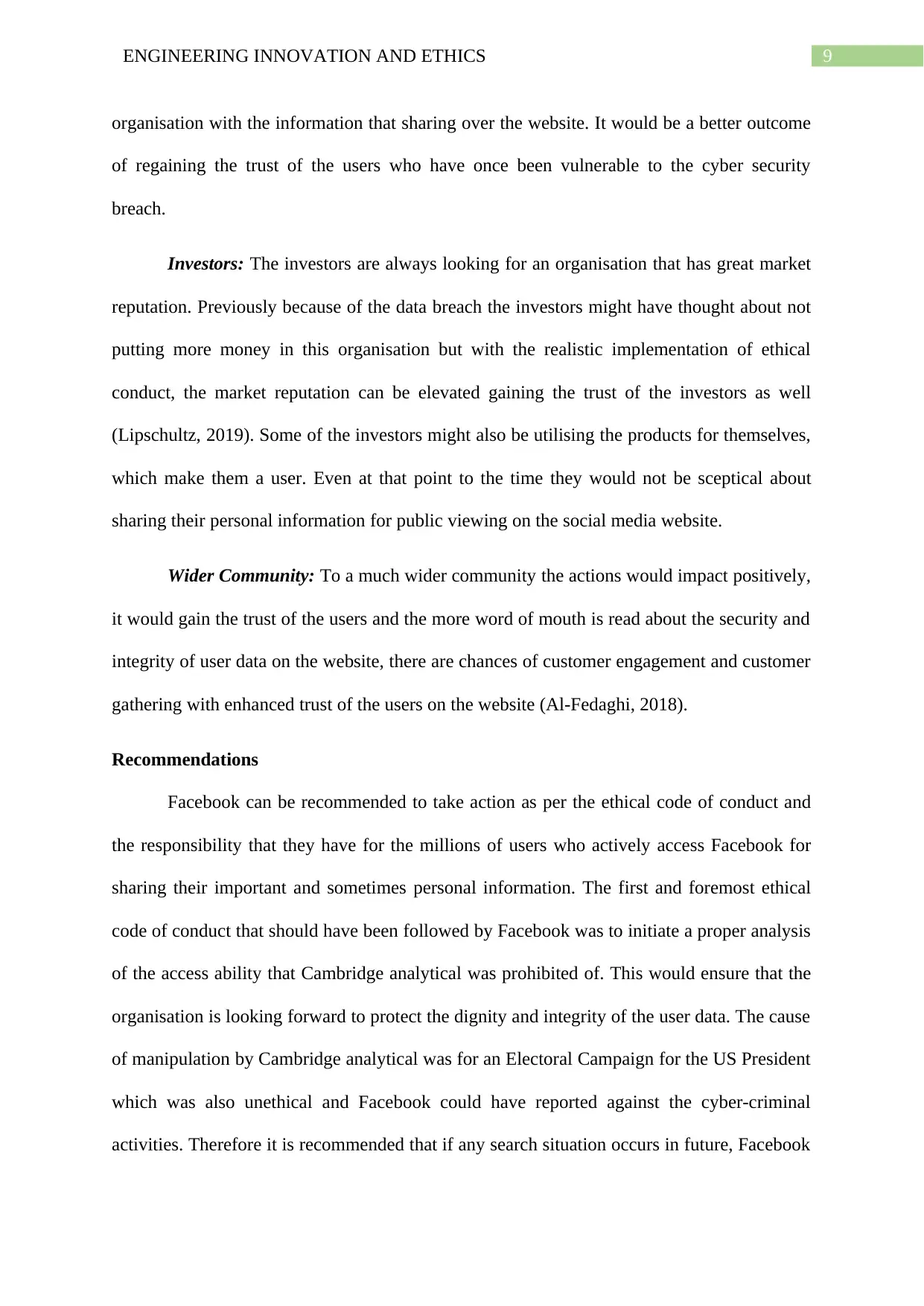
9ENGINEERING INNOVATION AND ETHICS
organisation with the information that sharing over the website. It would be a better outcome
of regaining the trust of the users who have once been vulnerable to the cyber security
breach.
Investors: The investors are always looking for an organisation that has great market
reputation. Previously because of the data breach the investors might have thought about not
putting more money in this organisation but with the realistic implementation of ethical
conduct, the market reputation can be elevated gaining the trust of the investors as well
(Lipschultz, 2019). Some of the investors might also be utilising the products for themselves,
which make them a user. Even at that point to the time they would not be sceptical about
sharing their personal information for public viewing on the social media website.
Wider Community: To a much wider community the actions would impact positively,
it would gain the trust of the users and the more word of mouth is read about the security and
integrity of user data on the website, there are chances of customer engagement and customer
gathering with enhanced trust of the users on the website (Al-Fedaghi, 2018).
Recommendations
Facebook can be recommended to take action as per the ethical code of conduct and
the responsibility that they have for the millions of users who actively access Facebook for
sharing their important and sometimes personal information. The first and foremost ethical
code of conduct that should have been followed by Facebook was to initiate a proper analysis
of the access ability that Cambridge analytical was prohibited of. This would ensure that the
organisation is looking forward to protect the dignity and integrity of the user data. The cause
of manipulation by Cambridge analytical was for an Electoral Campaign for the US President
which was also unethical and Facebook could have reported against the cyber-criminal
activities. Therefore it is recommended that if any search situation occurs in future, Facebook
organisation with the information that sharing over the website. It would be a better outcome
of regaining the trust of the users who have once been vulnerable to the cyber security
breach.
Investors: The investors are always looking for an organisation that has great market
reputation. Previously because of the data breach the investors might have thought about not
putting more money in this organisation but with the realistic implementation of ethical
conduct, the market reputation can be elevated gaining the trust of the investors as well
(Lipschultz, 2019). Some of the investors might also be utilising the products for themselves,
which make them a user. Even at that point to the time they would not be sceptical about
sharing their personal information for public viewing on the social media website.
Wider Community: To a much wider community the actions would impact positively,
it would gain the trust of the users and the more word of mouth is read about the security and
integrity of user data on the website, there are chances of customer engagement and customer
gathering with enhanced trust of the users on the website (Al-Fedaghi, 2018).
Recommendations
Facebook can be recommended to take action as per the ethical code of conduct and
the responsibility that they have for the millions of users who actively access Facebook for
sharing their important and sometimes personal information. The first and foremost ethical
code of conduct that should have been followed by Facebook was to initiate a proper analysis
of the access ability that Cambridge analytical was prohibited of. This would ensure that the
organisation is looking forward to protect the dignity and integrity of the user data. The cause
of manipulation by Cambridge analytical was for an Electoral Campaign for the US President
which was also unethical and Facebook could have reported against the cyber-criminal
activities. Therefore it is recommended that if any search situation occurs in future, Facebook
Paraphrase This Document
Need a fresh take? Get an instant paraphrase of this document with our AI Paraphraser
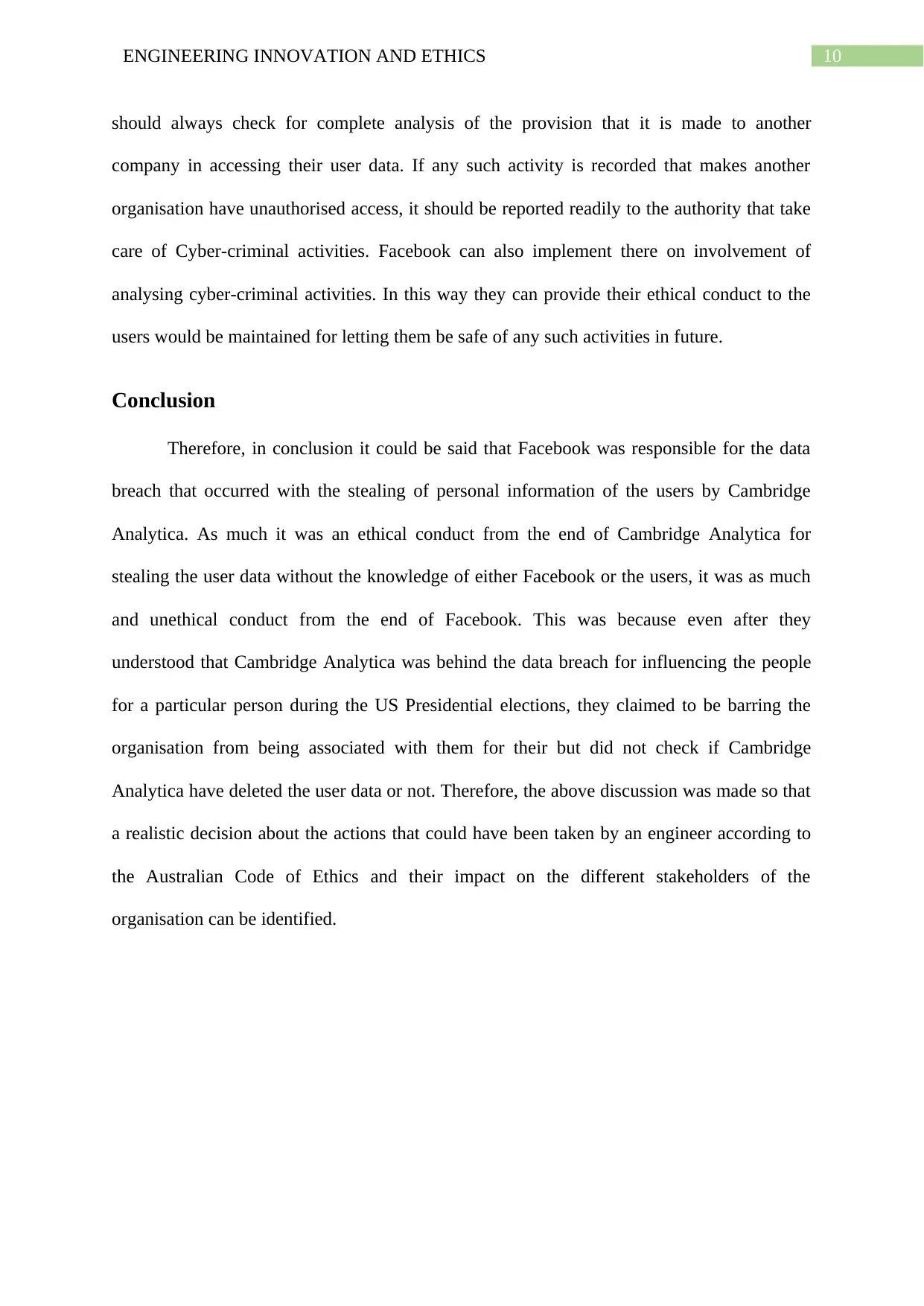
10ENGINEERING INNOVATION AND ETHICS
should always check for complete analysis of the provision that it is made to another
company in accessing their user data. If any such activity is recorded that makes another
organisation have unauthorised access, it should be reported readily to the authority that take
care of Cyber-criminal activities. Facebook can also implement there on involvement of
analysing cyber-criminal activities. In this way they can provide their ethical conduct to the
users would be maintained for letting them be safe of any such activities in future.
Conclusion
Therefore, in conclusion it could be said that Facebook was responsible for the data
breach that occurred with the stealing of personal information of the users by Cambridge
Analytica. As much it was an ethical conduct from the end of Cambridge Analytica for
stealing the user data without the knowledge of either Facebook or the users, it was as much
and unethical conduct from the end of Facebook. This was because even after they
understood that Cambridge Analytica was behind the data breach for influencing the people
for a particular person during the US Presidential elections, they claimed to be barring the
organisation from being associated with them for their but did not check if Cambridge
Analytica have deleted the user data or not. Therefore, the above discussion was made so that
a realistic decision about the actions that could have been taken by an engineer according to
the Australian Code of Ethics and their impact on the different stakeholders of the
organisation can be identified.
should always check for complete analysis of the provision that it is made to another
company in accessing their user data. If any such activity is recorded that makes another
organisation have unauthorised access, it should be reported readily to the authority that take
care of Cyber-criminal activities. Facebook can also implement there on involvement of
analysing cyber-criminal activities. In this way they can provide their ethical conduct to the
users would be maintained for letting them be safe of any such activities in future.
Conclusion
Therefore, in conclusion it could be said that Facebook was responsible for the data
breach that occurred with the stealing of personal information of the users by Cambridge
Analytica. As much it was an ethical conduct from the end of Cambridge Analytica for
stealing the user data without the knowledge of either Facebook or the users, it was as much
and unethical conduct from the end of Facebook. This was because even after they
understood that Cambridge Analytica was behind the data breach for influencing the people
for a particular person during the US Presidential elections, they claimed to be barring the
organisation from being associated with them for their but did not check if Cambridge
Analytica have deleted the user data or not. Therefore, the above discussion was made so that
a realistic decision about the actions that could have been taken by an engineer according to
the Australian Code of Ethics and their impact on the different stakeholders of the
organisation can be identified.
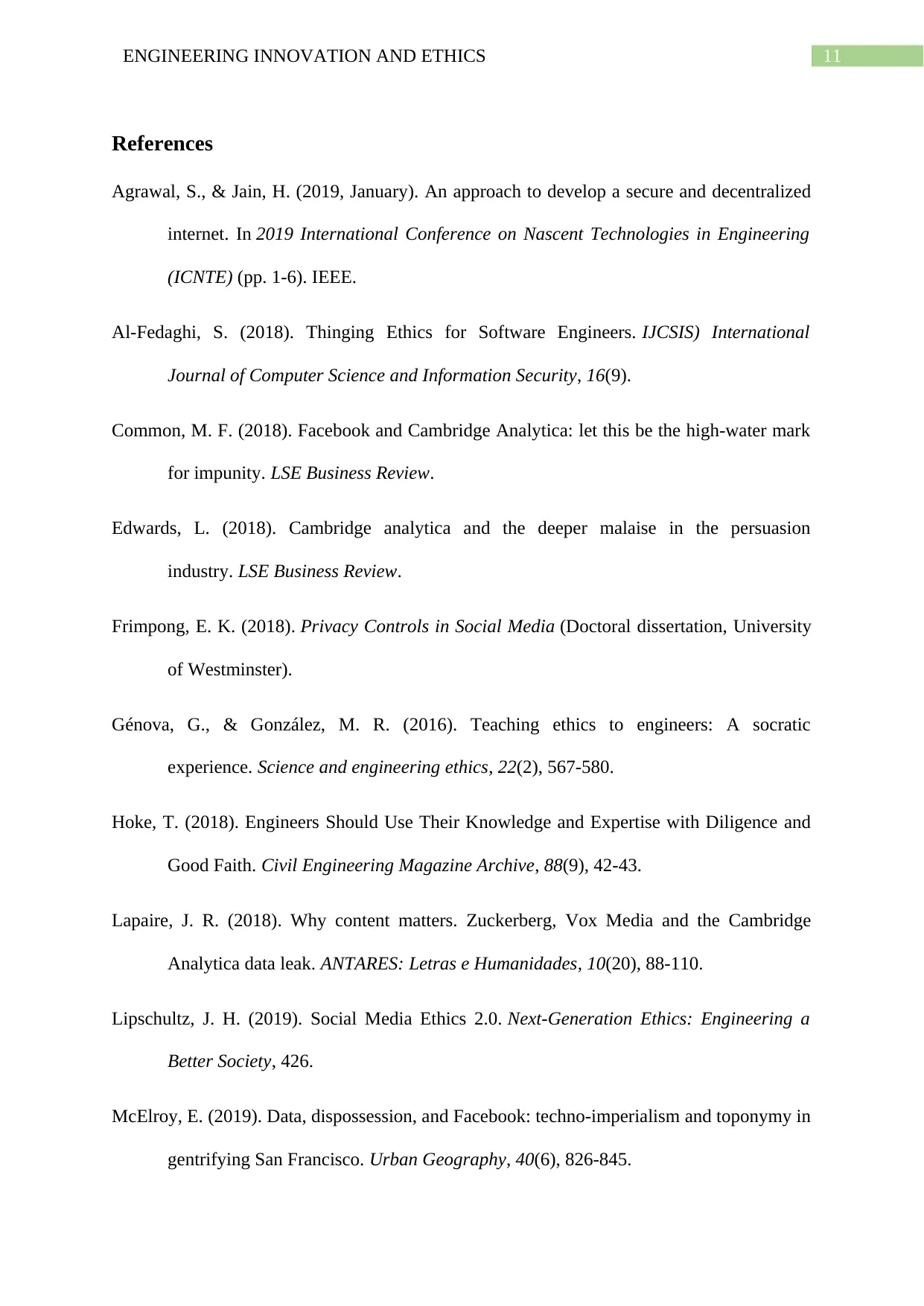
11ENGINEERING INNOVATION AND ETHICS
References
Agrawal, S., & Jain, H. (2019, January). An approach to develop a secure and decentralized
internet. In 2019 International Conference on Nascent Technologies in Engineering
(ICNTE) (pp. 1-6). IEEE.
Al-Fedaghi, S. (2018). Thinging Ethics for Software Engineers. IJCSIS) International
Journal of Computer Science and Information Security, 16(9).
Common, M. F. (2018). Facebook and Cambridge Analytica: let this be the high-water mark
for impunity. LSE Business Review.
Edwards, L. (2018). Cambridge analytica and the deeper malaise in the persuasion
industry. LSE Business Review.
Frimpong, E. K. (2018). Privacy Controls in Social Media (Doctoral dissertation, University
of Westminster).
Génova, G., & González, M. R. (2016). Teaching ethics to engineers: A socratic
experience. Science and engineering ethics, 22(2), 567-580.
Hoke, T. (2018). Engineers Should Use Their Knowledge and Expertise with Diligence and
Good Faith. Civil Engineering Magazine Archive, 88(9), 42-43.
Lapaire, J. R. (2018). Why content matters. Zuckerberg, Vox Media and the Cambridge
Analytica data leak. ANTARES: Letras e Humanidades, 10(20), 88-110.
Lipschultz, J. H. (2019). Social Media Ethics 2.0. Next-Generation Ethics: Engineering a
Better Society, 426.
McElroy, E. (2019). Data, dispossession, and Facebook: techno-imperialism and toponymy in
gentrifying San Francisco. Urban Geography, 40(6), 826-845.
References
Agrawal, S., & Jain, H. (2019, January). An approach to develop a secure and decentralized
internet. In 2019 International Conference on Nascent Technologies in Engineering
(ICNTE) (pp. 1-6). IEEE.
Al-Fedaghi, S. (2018). Thinging Ethics for Software Engineers. IJCSIS) International
Journal of Computer Science and Information Security, 16(9).
Common, M. F. (2018). Facebook and Cambridge Analytica: let this be the high-water mark
for impunity. LSE Business Review.
Edwards, L. (2018). Cambridge analytica and the deeper malaise in the persuasion
industry. LSE Business Review.
Frimpong, E. K. (2018). Privacy Controls in Social Media (Doctoral dissertation, University
of Westminster).
Génova, G., & González, M. R. (2016). Teaching ethics to engineers: A socratic
experience. Science and engineering ethics, 22(2), 567-580.
Hoke, T. (2018). Engineers Should Use Their Knowledge and Expertise with Diligence and
Good Faith. Civil Engineering Magazine Archive, 88(9), 42-43.
Lapaire, J. R. (2018). Why content matters. Zuckerberg, Vox Media and the Cambridge
Analytica data leak. ANTARES: Letras e Humanidades, 10(20), 88-110.
Lipschultz, J. H. (2019). Social Media Ethics 2.0. Next-Generation Ethics: Engineering a
Better Society, 426.
McElroy, E. (2019). Data, dispossession, and Facebook: techno-imperialism and toponymy in
gentrifying San Francisco. Urban Geography, 40(6), 826-845.
⊘ This is a preview!⊘
Do you want full access?
Subscribe today to unlock all pages.

Trusted by 1+ million students worldwide
1 out of 13
Related Documents
Your All-in-One AI-Powered Toolkit for Academic Success.
+13062052269
info@desklib.com
Available 24*7 on WhatsApp / Email
![[object Object]](/_next/static/media/star-bottom.7253800d.svg)
Unlock your academic potential
Copyright © 2020–2025 A2Z Services. All Rights Reserved. Developed and managed by ZUCOL.




